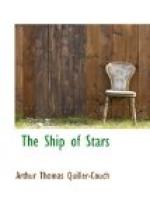“That’s azactly the reason—I can set ’em afire with a breath, but I can’t hold ’em under. I make ’em too strong for me—and I’m afeard. Parson, dear, it’s the gospel truth; for two years I’ve a been strivin’ agen myself, wrastlin’ upon my knees, and all to hold this parish in.” He mopped his face. “‘Tis like fightin’ with beasts at Ephesus,” he said.
“Do you want to hold them in?”
“I do, and I don’t. I’ve got to try, anyway. Sometimes I tell mysel’ ’tis putting a hand to the plough and turning back; and then I reckon I’ll go on. But when the time comes I can’t. I’m afeard, I tell ’ee.” He paused. “I’ve laid it before the Lord, but He don’t seem to help. There’s two voices inside o’ me. ’Tis a terrible responsibility.”
“But the people: what are you afraid of their doing?”
“I don’t know. You don’t know what a runaway hoss will do, but you’re afeared all the same.” He sank his voice. “There’s wantonness, for one thing—six love-children born in the parish this year, and more coming. They do say that Vashti Clemow destroyed her child. And Old Man Johns—him they found dead on the rocks under the Island—he didn’t go there by accident. ’Twas a calm day, too.”
As often as not Taffy worked late and blew his forge-fire alone in the church, the tap of his hammer making hollow music in the desolate aisles. He was working thus one windy night in February, when the door rattled open and in walked a totally unexpected visitor—Sir Harry Vyell.
“Good evening! I was riding by and saw your light in the windows dancing up and down. I thought I would hitch up the mare and drop in for a chat. But go on with your work.”
Taffy wondered what had brought him so far from his home at that time of night, but asked no questions. And Sir Harry placed a hassock on one of the belfry steps, and taking his seat, watched for a while in silence. He wore his long riding-boots and an overcoat with the collar turned up about a neckcloth less nattily folded than usual.
“I wish,” he said at length, “that my boy George was clever like you. You were great friends once—you remember Plymouth, hey? But I dare say you’ve not seen much of each other lately.”
Taffy shook his head.
“George is a bit wild. Oxford might have done something for him; made a man of him, I mean. But he wouldn’t go. I believe in wild oats to a certain extent. I have told him from the first he must look after himself and decide for himself. That’s my theory. It makes a youngster self-reliant. He goes and comes as he likes. If he comes home late from hunting I ask no questions; I don’t wait dinner. Don’t you agree with me?”
“I don’t know,” Taffy answered, wondering why he should be consulted.
“Self-reliance is what a man wants.”
“Couldn’t he have learnt that at school?”
Sir Harry fidgeted with the riding-crop in his hands. “Well, you see, he’s an only son—I dare say it was selfish of me. You don’t mind my talking about George?”




